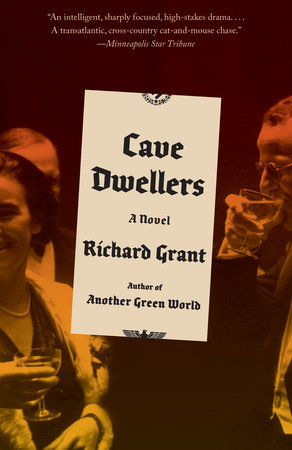Cave Dwellers Reader’s Guide
By Richard Grant


1. Why do you think the title Cave Dwellers was chosen for this novel? Who are the cave dwellers referenced and why are they so named? What do these cave dwellers share in common?
2. Why does the old brigadier believe that people do not speak up against Hitler? What is the “golden vice” that he speaks of and how does this affect people’s moral decision making? Do you agree with his assertion that this is why people do not object to Hitler?
3. Why does Oskar tell Leo he has decided to take on the mission assigned to him by Jaap? What does he believe a nation is “more than”? Is he successful in his mission?
4. Why do Lena and Stefan leave their jobs in Germany and travel to the United States? How had their profession changed prior to their departure? What are the Blue Papers and who is their author? What do these papers reveal about the conditions in Germany?
5. In the car on the way to Bremen, Lena tells a story. When she finishes, she and Clair speculate as to what the moral of the story might be. Hagen declares that the story is only a simple folktale meant for children. With whom do you agree? Does every story, in fact, have a moral? Does Grant’s novel seem to have a moral? Discuss. What does the book indicate about morality itself?
6. What is “poisonous music”? Why had particular pieces of music been banned in Germany and how did the characters in the novel respond to this censorship? Does the novel indicate why particular pieces were considered threatening by their censors? What does this suggest about the purpose, power, or usefulness of art?
7. Stefan claims that it is easy to tell who and what people are, but what does the novel suggest about the judgment of others? Would you say that the characters are good judges of one another? Explain. Consider your own assessment of the characters as the story progressed. Were you surprised by any of the characters? If so, why? How did these characters resist or overturn stereotypes?
8. In the chapter titled “What Herr Boar Has to Say,” we learn that Kohlwasser believes that “one’s actions and motives are seldom purely noble or diabolical” (page 261). Do you agree with him? Why or why not? Does the novel seem to support his view or to refute it?
9. Explore the theme of loyalty. To what or to whom are the various characters in the book loyal? What seems to unite various groups of characters? Does the novel ultimately answer the question of loyalties?
10. How does the novel characterize the German and international intelligence communities? How are agents chosen? Are they a cooperative group? What is their primary motive and what obstacles do they face as they conduct their work?
11. When Oskar tells Dr. Kleister that he considers himself a patriot, Dr. Kleister confesses that he once considered himself a patriot but no longer knows what the word means. Does the novel attempt to suggest how to define patriotism? Which of the characters in the novel would you consider patriots?
12. Evaluate the setting of the novel, including the author’s descriptions of the forests and the German countryside. How do depictions of natural scenery contribute to a dialogue about the major themes of the novel? What might these scenes suggest, for instance, about history, the passage of time, or the relationship of humankind and the natural world?
13. Explore the theme of truth. How do the characters assess and decipher what is true and what is not? What factors make it difficult for them to discern the truth? Does the book ultimately reveal how one may tell what is true and what is not? What does the book suggest about the corresponding themes of belief and disbelief?
14. Explore the novel as a love story. How is love defined within the novel and what kinds of love are represented? Who are the protagonists within the love story and how does the author treat the classical literary themes of romantic and forbidden love? How is love challenged, and does love prevail?
15. At the conclusion of the story, why is Kohlwasser so upset by what he finds when he arrives at the police station? What has happened to Oskar, Lena, Hagen, and Clair? Is their fate surprising? Why or why not? How does the press ultimately represent this story in the newspapers?
16. Evaluate genre. Consider how the author employs or otherwise dispenses with traditional characteristics of the spy-thriller genre. As a work of historical fiction, how does the novel reinforce or shed new light on your interpretation of the historical period and themes represented? What other genres or subgenres are represented and how did the novel challenge your previous ideas about those genres?
Just for joining you’ll get personalized recommendations on your dashboard daily and features only for members.
Find Out More Join Now Sign In